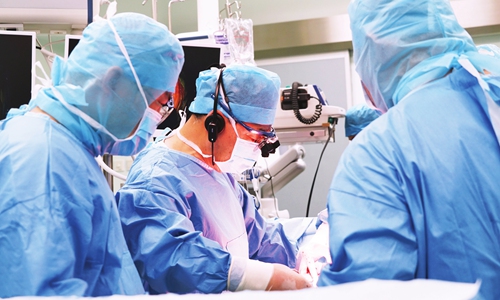
Chinese doctors are placing an artificial heart into the patient body. Photo: cnsphoto
China's first domestic magnetically levitated artificial heart, developed by CH Biomedical in Suzhou, East China's Jiangsu Province, has been approved for commercial use, marking that the surgical treatment for heart failure in China has entered the era of artificial heart, one hospital president said at a seminar.
Hu Shengshou, president from Shenzhen-based Fuwai Hospital made the remarks on Saturday during a seminar on severe heart diseases. Hu said heart failure is the final stage of heart disease, and as China enters the ageing era, the prevalence of heart failure cases continues to increase.
At present, China has more than 10 million patients suffering from heart failure, with many requiring heart transplant surgery. However, the source of donor hearts is limited, and a significant number of patients pass away while waiting for a matching donor heart. As a result, artificial hearts are seen as a key breakthrough.
According to Hu, maglev hearts, which is smaller and more compatible, can reduce blood stagnation and thrombosis, significantly improving clinical outcomes.
Although China's artificial heart research emerged behind that of mature economies, it gained rapid progress. Since 2017, China has developed three types of artificial hearts, including the one from Shenzhen, which is the world's smallest and lightest maglev artificial heart.
With the development of "Chinese hearts" on the market, the country will provide new choices for the global artificial heart market dominated by foreign players, Hu said.
In May this year, the National Health Commission issued a management code, requiring medical institutions that carry out artificial heart implantation surgery to meet prescribed technical thresholds.
Hu noted that it is necessary to strengthen the standardized training of medical and nursing staff and develop more professional teams to work together, in order to ensure the normal clinical use of patients after implanting artificial heart, as well as guaranteeing medical quality and safety.
Global Times
